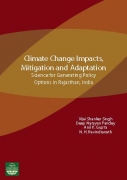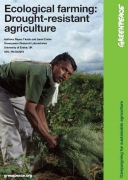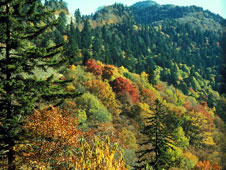/topics/climate-change
Climate Change
High altitude wetland protected areas in western Arunachal Pradesh - Identification and demarcation using GIS
Posted on 27 Dec, 2010 11:15 PMGuest Post by Shashank Srinivasan
High altitude wetlands in the Indian Himalayas are crucial to the water security of downstream communities. They buffer the flow of glacial meltwater to sustain river flow in the dry season, ensuring that human settlements have access to water when they need it most.
High altitude wetlands are also reservoirs of biodiversity and contribute local livelihood opportunities. Identifying these wetlands and demarcating areas for their protection is thus crucial to any wetland management plan.
In this poster, a method of using topographic data obtained by remote sensing techniques, to identify the catchment areas of these wetlands has been described.
The author suggests that the protection of these catchment areas will ensure the survival of these wetlands, as well as of the communities that depend on them.
Guidelines for water safety plans for rural water supply systems by the Sulabh International Academy of Environmental Sanitation
Posted on 27 Dec, 2010 07:20 PMThis document by the Sulabh International Academy of Environmental Sanitation presents the guidelines for water safety plans for rural water supply systems. The revised National Rural Drinking Water Programme (NRDWP) Guidelines 2009-2012 issued by Rajiv Gandhi National Drinking Water Mission, Department of Drinking Water and Sanitation has shifted the focus from source development and installation of water supply system for providing drinking water supply to rural household to focus on development of village security plan.
Mitigating climate change through organic agriculture - Keynote address at the Third Organic Farming Association of India Convention, held at Anand, Gujarat (2010)
Posted on 25 Dec, 2010 10:43 PMGreen Revolution (GR) technologies, supported by official policies, and fuelled by agro-chemicals, machinery and irrigation, are well known to have improved agricultural production and productivity. While these technologies greatly helped developing countries to address their food-security and food-sovereignty needs, farmers using these technologies have had to depend on external inputs.
Cancun: Is it a climate meet with a difference?
Posted on 25 Dec, 2010 07:58 PMDespite the pre-Cancun Wikileaks revelation of U.S. strong-arm tactics at the Copenhagen summit, and U.S. climate envoy Todd Stern's remarks about "climate bribery", wherein he said countries asking for aid were in no position to accuse the U.S. of bribery; it is largely perceived that the Cancun Climate Meet has picked up the lost momentum of Copenhagen.
193 nations met at Cancun to debate on how to move forward on the climate change adaptation process and drafted the Cancun Agreement.
Saving rice - Ambitious plans to increase productivity
Posted on 24 Dec, 2010 10:13 AMEnormous funds are being poured into research aimed at improving seed varieties, with a heavy focus on developing hybrid rice. Is it the right option for millions of small rice farmers who are already battling high input costs and increasingly unpredictable weather? Or does part of the solution lie in efficient methods of cultivation that will cut down water use and improve yield?
Film Festival on "Green Unplugged"
Posted on 23 Dec, 2010 12:05 PMContent and Image Courtesy: Culture Unplugged
Culture Unplugged Studios will be launching ‘Green Unplugged’ - the festival where we unite to explore the nature, that flows without & within us. This festival aspires to contemplate on the environment and the need to co-create future generation with love & respect for mother earth. It aspires to overlap the sound of our cry today with that of nature and hopes to collectively perceive a new path. We invite your conscious films that may help us all wake to our holistic future - an integral individual & human community thriving in co-existence with nature. With your co-operation, the festival hopes to bring context to our existence and reveal the evolving divine - the truth of life, hidden in nature‘s dream of tomorrow.
Climate change impacts, mitigation and adaptation - Science for generating policy options in Rajasthan
Posted on 20 Dec, 2010 09:14 PM This paper by Rajasthan Pollution Control Board on climate change impacts in the context of Rajasthan seeks to address the issue of need of the society for robust knowledge to pursue strategies for mitigation as well as adaptation in order to address the challenges associated with global warming and climate change.
This paper by Rajasthan Pollution Control Board on climate change impacts in the context of Rajasthan seeks to address the issue of need of the society for robust knowledge to pursue strategies for mitigation as well as adaptation in order to address the challenges associated with global warming and climate change.
Accordingly, here a brief review of the available literature and an annotated bibliography of published research on climate change impacts, mitigation and adaptation in order to facilitate the identification of policy options in Rajasthan is provided.
Also included is the literature on how human societies contribute to environmental change and how, in turn, become vulnerable to these changes. It also explores the available knowledge on how likely ecosystem goods and services are impacted to climatic oscillations (environmental sensitivity) and the ability of rural communities to cope (social resilience) with those changes.
Ecological farming: Drought resistant agriculture – A paper by Greenpeace
Posted on 20 Dec, 2010 08:09 PM This paper by Greenpeace on ecological farming illustrates proven, modern farming approaches that help cope with drought. It elaborates on the drought-resistant crop varieties and calls for policy makers to increase funds for research on the system.
This paper by Greenpeace on ecological farming illustrates proven, modern farming approaches that help cope with drought. It elaborates on the drought-resistant crop varieties and calls for policy makers to increase funds for research on the system.
Human-induced climate change is resulting in less and more erratic rainfall, especially in regions where food security is very low. The poor in rural and dry areas will suffer the most and will require cheap and accessible strategies to adapt to erratic weather. This adaptation will need to take into account not only less water and droughts, but also the increased chance of extreme events like floods.
Biodiversity and a healthy soil are central to ecological approaches to making farming more drought-resistant and more resilient to extreme events. Practices that make soils better able to hold soil moisture and reduce erosion and that increase biodiversity in the system help in making farm production and income more resilient and stable.
Greener climate prediction by NASA shows plants slow warming
Posted on 20 Dec, 2010 06:01 PMArticle and Image Courtesy: NASA
A new NASA computer modeling effort has found that additional growth of plants and trees in a world with doubled atmospheric carbon dioxide levels would create a new negative feedback – a cooling effect – in the Earth's climate system that could work to reduce future global warming.
 A new NASA modeling effort found that in a doubled-carbon dioxide world plant growth could lessen global warming by about 0.3 degrees C globally. The same model found that the world would warm by 1.94 degrees C without this cooling feedback factored in. Image: Great Smoky Mountains National Park; Credit: National Park Service
A new NASA modeling effort found that in a doubled-carbon dioxide world plant growth could lessen global warming by about 0.3 degrees C globally. The same model found that the world would warm by 1.94 degrees C without this cooling feedback factored in. Image: Great Smoky Mountains National Park; Credit: National Park Service
Global warming mapped: Updates from Earth Observatory
Posted on 20 Dec, 2010 05:44 PMArticle Courtesy: Earth Observatory
Image Courtesy: NASA
The world is getting warmer. Whether the cause is human activity or natural variability, thermometer readings all around the world have risen steadily since the beginning of the Industrial Revolution.





